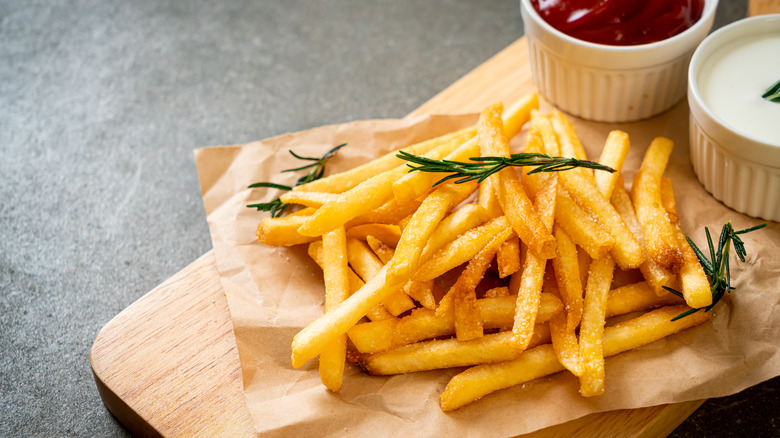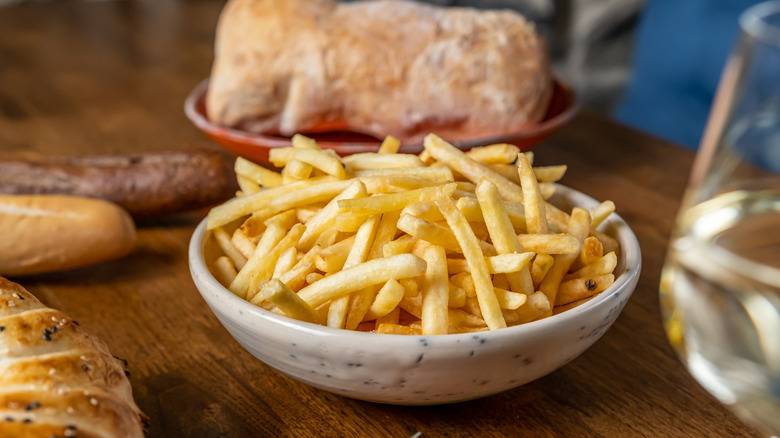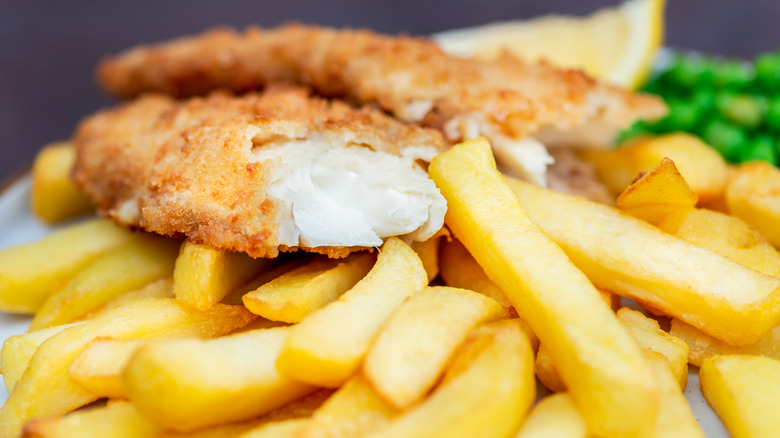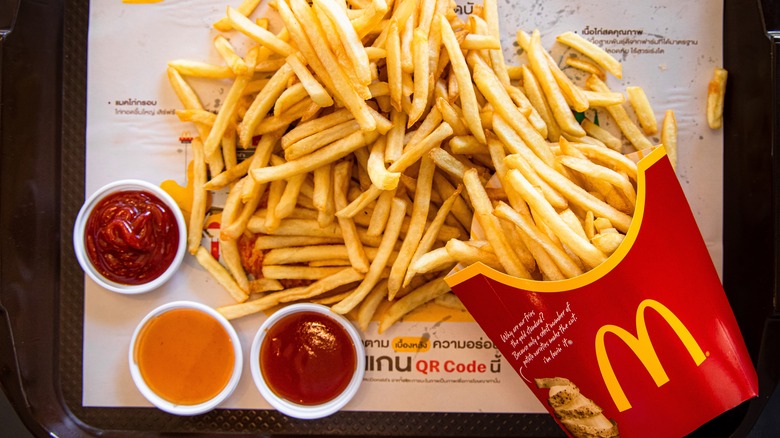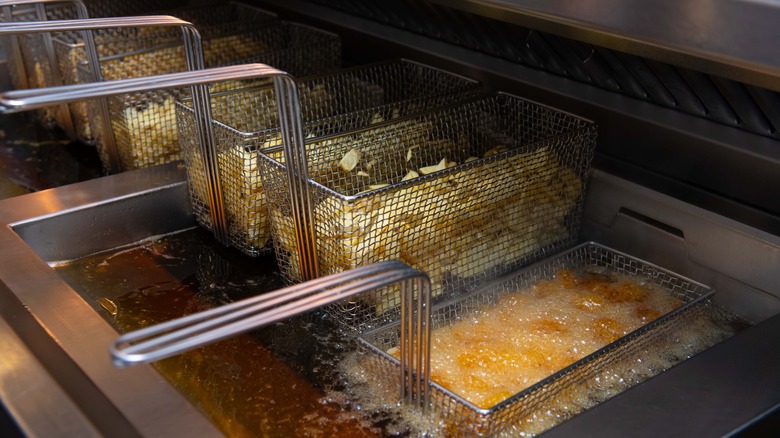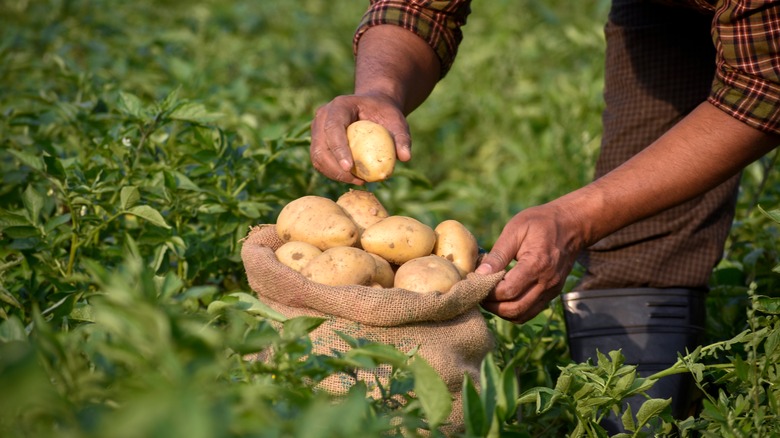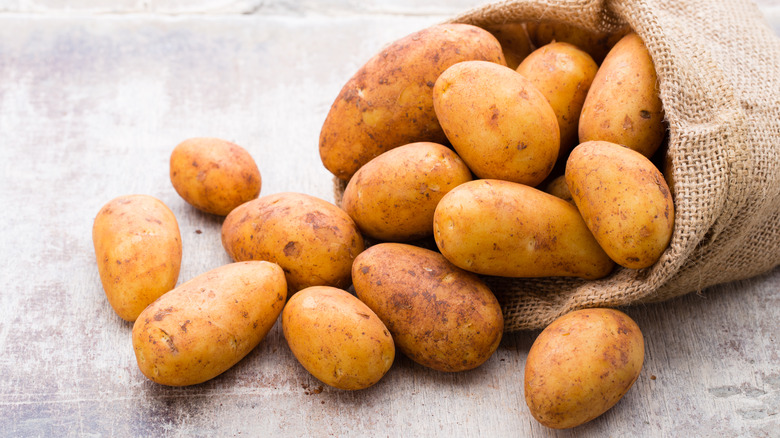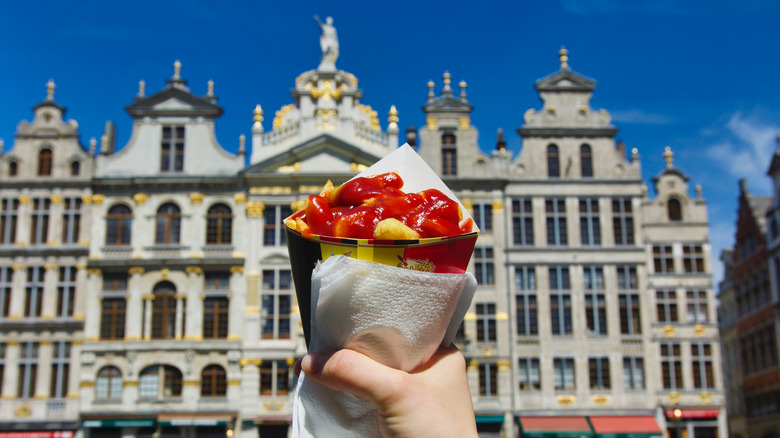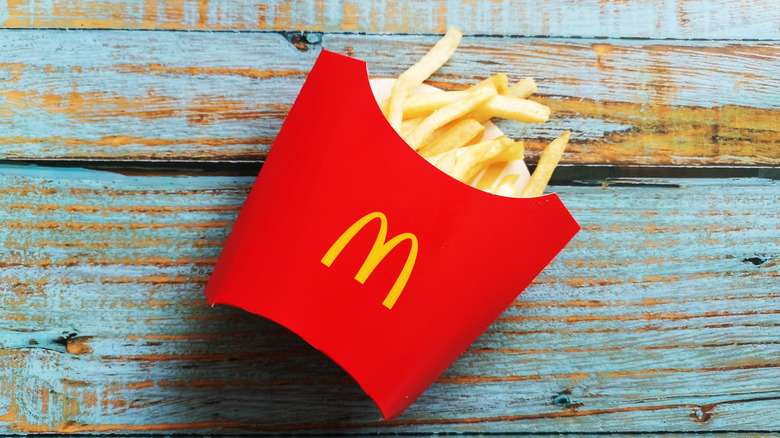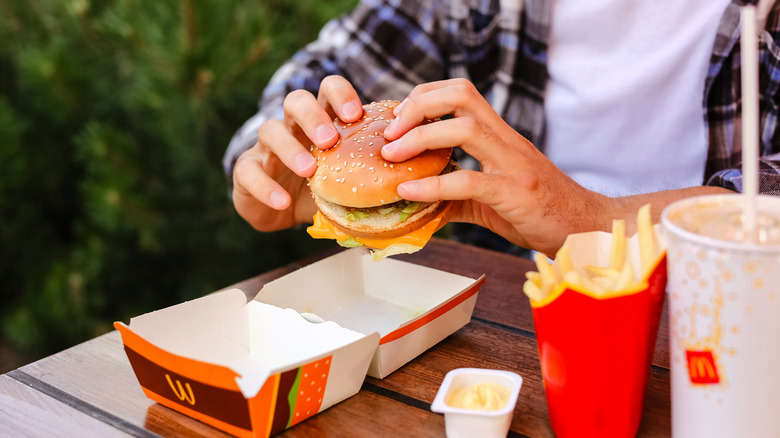Myths About French Fries People Believe
French fries are one of the most beloved and consumed fast foods in the U.S. In fact, according to National Geographic, an American eats, on average, around 25 pounds of the golden strips a year. The country even has a National French Fry Day to celebrate the deep-fried snack. Typically eaten as a side dish to burgers, steaks, and fish, french fries come in all shapes and sizes, from the traditional shoestring to curly or crinkled.
Golden and crispy, french fries are a fast food staple. In fact, they appear on the menus of most chain restaurants. In particular, they are a common — and usually expected — addition to meal deals at popular fast food joints such as McDonald's, Burger King, and KFC. Alternatively, a frozen version of french fries can be found in most supermarket freezers.
Considering their popularity, french fries have generated a surprising amount of disinformation. Confused about what's true and what's not? Keep reading.
French fries were invented in France
It's a common misconception that french fries hail from France. So much so that when France opposed the Iraq war, the U.S. renamed the fast-food snack "freedom fries." According to Frenchly, french fries originated in modern-day Belgium in the late 1600s. The story goes that french fries were invented in the Meuse Valley after the rivers froze in winter, preventing fishing. As National Geographic notes, the locals cut up potatoes into strips and fried them when they didn't have fish to cook up.
As the Farmers' Almanac explains, potatoes didn't become popular in France until an army medical officer named Antoine-Augustin Parmentier encouraged the country to reconsider the vegetable after eating a bunch while a prisoner of war. Up until the 1770s, the French believed potatoes were not suitable for human consumption, but Parmentier, who knew otherwise, convinced the government to lift their ban against the starchy crop.
It's unclear how french fries got their name. As Frenchly shares, there's one theory that American World War I soldiers dubbed the snack french fries after discovering it in southern Belgium where the language is predominantly French. This story is unlikely to be correct, however, because as the outlet notes, Thomas Jefferson was apparently already asking for his potatoes to be styled "in the French manner" in 1802. In fact, the president is credited with introducing french fries to the U.S. after serving as the American Minister to France from 1784 to 1789.
French fries and British-style chips are the same
It turns out that ordering deep-fried potatoes cut into strips can be more complicated than we think — particularly if you're traveling abroad. In the U.K, french fries refer to McDonald's-style skinny, golden fried potato sticks; hot chips to their more thickly cut counterparts. As Spoon University notes, the British chips that you would get in an order of fish and chips are more like a steak fry than a standard french fry.
In the U.S, the term french fries refers to a huge range of different styles and shapes of deep fried potatoes. Aside from the thinly-cut french fries that we all know and love, the snack can take the form of ultra-skinny shoestring fries, curly fries, waffle fries, and crinkle fries. The British call pre-packaged, thinly-sliced potato snacks that line the shelves of most supermarkets crisps. Meanwhile, chips in America are what the British refer to as crisps.
All restaurant french fries are vegan
While potatoes in their most basic form are certainly vegan, some french fries aren't even vegetarian. It all depends on the preparation method. For example, as Taste notes, authentic Belgian french fries are fried in animal fat. While this method isn't ubiquitous, some restaurants do utilize animal-derived products when cooking french fries, according to Conscious Plant Kitchen. As the site points out, most dining establishments use frozen french fries to save on the labor costs associated with prepping the side dish, and while frozen french fries are usually plant-based, some may contain non-vegan ingredients such as milk or animal flavoring. This is why it always pays to check the ingredient list if you are buying frozen french fries at your local grocery store.
So how vegan-friendly are the french fries purchased at fast food restaurants? The answer is, it depends on the chain. According to The Kitchen Community, when it comes to vegan french fries, your best bet is Burger King, which prepares them in vegetable oil and designated fryers. In-N-Out's french fries are also a great vegan option since they are prepared using 100% sunflower oil. While KFC, Taco Bells, and Wendy's technically offer vegan french fries, the franchises fry them in the same oil as other menu items, which means that diners can expect cross-contamination. Unfortunately, things don't look so vegan-friendly at the world's leading franchise, McDonald's. The chain's fries contain hydrolyzed milk and natural beef flavor, which, as LiveStrong points out, means that they are not even vegetarian.
Restaurants only deep fry french fries once
The art of making french fries that are golden and crispy on the outside and soft and fluffy in the center involves numerous steps. The potatoes all need to be cut into equally-sized strips, stored in water to rinse any excess starch, and dried prior to deep frying. They also need to be cooked in oil with a high smoke point, such as canola oil, that won't burn at high temperatures. However, as The Daily Meal notes, another very important part of the restaurant french fry-making process that many of us may not know about is double frying.
Deep-frying french fries twice ensures that they are crispy on the outside and fully cooked on the inside. To obtain the perfect texture, french fries need to be cooked at a temperature of around 325 degrees Fahrenheit first to cook the inside of the potatoes and then submerged in 375 degrees Fahrenheit to make them crispy on the outside. The fries should rest for at least 15 minutes on a paper-lined surface between the frying sessions. Alternatively, as Spruce Eats points out, once-fried french fries can also be refrigerated for a period of time before they are popped back into hot oil.
Eating french fries is just like eating potatoes
If you think that french fries are good for you just because they are made from potatoes, think again. While potatoes can be a decent source of fiber, potassium, and vitamins B6 and C, this is only if they are baked and unpeeled. According to Nutrition Letter, as soon as the skin is peeled — which commonly happens in the case of french fries — potatoes drop some of this nutritional content. Furthermore, the deep-frying process used to make french fries increases their calorie content, thus decreasing their nutritional value per calorie. Last but not least, french fries are usually salted, which isn't great considering that many of us already consume more than the recommended amount of sodium per day.
Eating french fries on a regular basis has both short- and long-term consequences. One of the short-term effects of consuming french fries are stomach problems since our bodies don't digest fats as fast as they do carbs and proteins. According to The American Journal of Clinical Nutrition (via Eat This), a study of 4,500 adults found that those who ate french fries more than two times per week doubled their risk of early death. While the researchers associated this with the oil the potatoes were fried in and not with the vegetable itself, the point that french fries aren't the healthiest dietary option still stands.
It doesn't matter what potatoes you use
While they may look similar, not all potatoes are suitable for making french fries. Without a doubt, the best potato variety for making french fries is russet. Most commonly grown in Idaho, these potatoes contain a high amount of starch and are low in moisture, per Spruce Eats. During the frying process, Grower Expert notes that the starch that makes the french fries crispy and the low moisture content that prevents them from becoming hollow. This said, according to The Daily Meal, russet — or any other potato type for that matter — should be rinsed off prior to frying to get rid of any excess starch and prevent the french fries from turning too brown.
While russet potatoes are considered the best choice for french fries, they can be substituted by other starchy potato varieties such as Gold Rush, King Edward, and Yukon Gold. Whatever potato type you decide on, for best results opt for firm, rather than spongy, vegetables. Stay away from potatoes with dark spots or eyes since this may be an indication they are past their prime. It's best to select large potatoes that are all around the same size since this makes them easier to slice and will give the fries an appealing shoestring shape, according to Fine Cooking.
Americans consume the most french fries in the world
As the birthplace of some of the world's largest fast food franchises, the U.S. is an obvious choice when thinking about french fry consumption. But if you think that Americans are the world's biggest consumers of the fast food staple, you're in for a surprise. As The Wall Street Journal noted, while Americans certainly enjoy a fry or two, it's the Belgians who take the title of the snack's biggest consumers. In 2010, Reuters reported that Belgium sports around 5,000 fry vendors.
Belgium is the world's biggest exporter of frozen potato products, including french fries. According to Reuters, each year the country turns 5.3 million tons of potatoes into frozen goods that are sent all around the world. As such, it's not surprising that the outbreak of Covid-19 had a devastating impact on the industry. As cafes and restaurants closed and exports decreased, Belgium was left with a huge surplus of potatoes. The solution? Industry leaders urged Belgians to eat more french fries. "We know Belgians like their fries, it's [an] intangible heritage [of] our frying culture, so we ask Belgians to consume an extra portion of fries to allow us to process more potatoes and to avoid food waste," the secretary-general of industry group Belgapom, Romain Cools, told Reuters in April 2020.
French fries appeared on the original McDonald's menu
French fries are an indisputable McDonald's staple that accompanies most of the chain's menu items. As such, it may come as a surprise that the franchise didn't start serving french fries until 1949 — nine years after the original McDonald's menu came on the scene. At the time, the fried potato snack replaced potato chips on the restaurant's limited menu. The other offerings included hamburgers, cheeseburgers, soft drinks, milk, coffee, and pie.
Today, McDonald's french fry formula remains largely the same as when the snack was first added to the menu. "We only use whole potatoes, and they must meet our set of high standards related to size, shape, varietal, color, and storability," McDonald's Quality and Supply Chain Executive, Any Wilcox, told Yahoo Finance. "[For the french fries,] everything from the cook time to the amount of salt is carefully measured."
Some of McDonald's french fry recipe changes that have taken place over the years have had more to do with the quality of the oil used by the franchise than the potatoes themselves. In 1990, the chain started preparing its fries in cholesterol-free, 100% vegetable oil. Later, in 2008, McDonald's made the announcement that all its french fries sold in the U.S. and Canada would contain zero grams of trans-fat.
Eating McDonald's french fries will help you get pregnant
According to The Bump, a study conducted by Channel Mum found that some women believe that eating McDonald's french fries after sex increases the chances of conception. And in particular, it's the snack's high salt content that has been credited with increasing fertility with some saying that "it prompts the body to 'soak up' extra fluid."
If you're looking for any scientific evidence to back up this claim, you may find yourself disappointed. Nevertheless, the founder of Channel Mum, Siobhan Freegard, seems to think that there may be some merit to the claim. "Our members swear [french fries] have all helped and we have hundreds of bouncing new babies to prove it," she says. Ashley Edwards Walker who writes for The Bump agrees, saying, "I have found a lot of anecdotal accounts from internet IVF moms who tried it and ended up with take-home babies." We think that the strategy is worth a try. And if all else fails, at least you might end up with an "After this we are getting fries" T-shirt to show for your efforts.
Eating McDonald's french fries helps cure baldness
In 2017, researchers at the Yokohama National University in Japan discovered that dimethylpolysiloxane — a chemical found in McDonald's deep-frying oil — is beneficial to hair regeneration, per ScienceDirect. As noted in Science Daily, the researchers used the chemical as an ingredient to help get hair follicle germs ready for transplant. While not actually an ingredient in the potatoes themselves, according to USA Today, the McDonald's site explains dimethylpolysiloxane is added to the cooking oil to stop it from foaming.
Some publications were quick to capitalize on the research and the McDonald's connection with misleading headlines such as "Chemical in McDonald's Fries Could Cure Baldness, Study Says." In reality, there's absolutely no evidence that eating McDonald's french fries is going to give you a fabulous mane of hair, or any hair for that matter. As Neoscope pointed out, at no stage of the research were there any references made to any miraculous hair growth, nor the franchise or its french fries.
